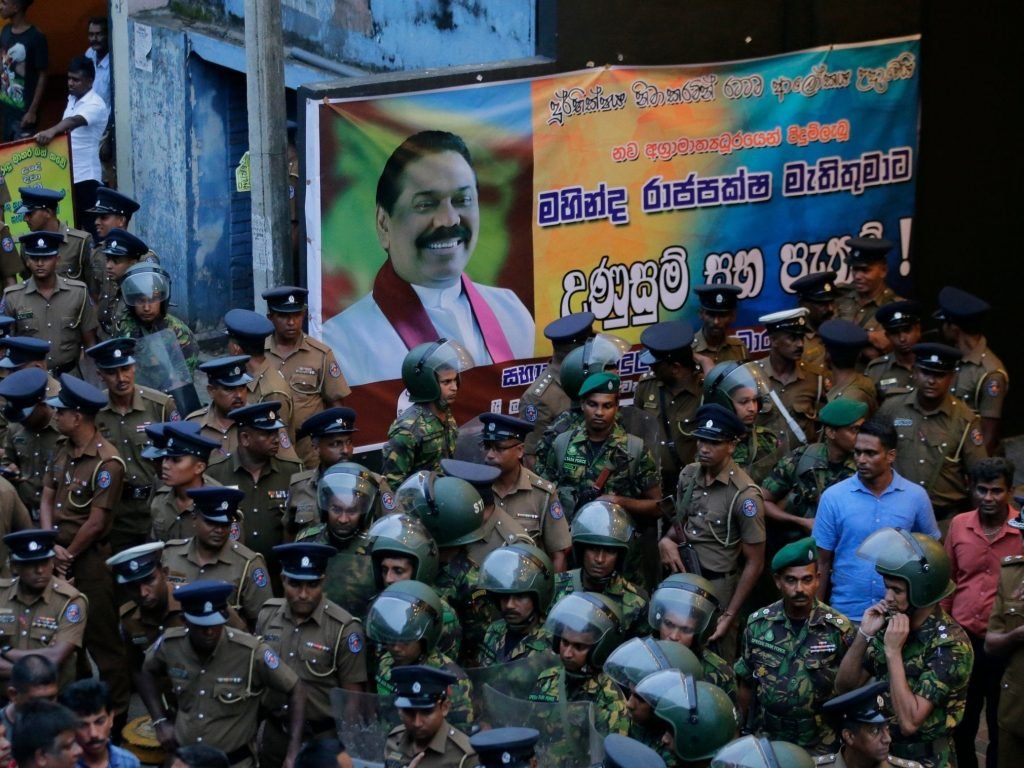Mahinda Rajapaksa resigned as Prime Minister of Sri Lanka, demanding that he and his brother, the country’s President Gotabaya Rajapaksa, step down from the country’s worst economic crisis in decades.

Mahinda Rajapaksa said on Twitter that he submitted his resignation to President Gotabaya Rajapaksa, a move that followed violent attacks on protesters by government supporters, followed by the deployment of armed troops to Colombo. The deployment came after violence was reported in several parts of the country, with a nationwide curfew until Wednesday, on top of the state of emergency that the president declared last week.
Hours after Mahinda’s resignation, his supporters attacked anti-regime protesters outside President Gotabaya’s office, injuring about 173 people and triggering widespread violence against pro-Rajapaksa politicians. A hospital official said at least nine people were taken to the National Hospital in Colombo for treatment with injuries or tear gas. More than 200 people were injured during the day. At least five people, including ruling party MP Amarkirthi Athukorale, were killed in the violence in different parts of the country.
Supporters of Rajapaksa on Monday attacked protesters who had been protesting outside the prime minister’s official residence for weeks, beating them with wooden and iron sticks. He then marched to the presidential office, where he also attacked protesters and set their camps on fire. Police fired tear gas and water cannons, but that was not enough to control the crowd. Sri Lankan media also reported that the fire started near the back gate of Temple Trees, the official residence of the Prime Minister of Sri Lanka.
A police spokesman said Athukorale and his bodyguard died in Nittambuwa, about 30 kilometers (20 miles) north of Colombo, when the car they were traveling in was stopped by an angry mob. The spokesman said Athukorale or his bodyguard opened fire at the protesters, who chased them and trapped them inside a building, where their badly beaten bodies were recovered by police several hours later. He said three people were admitted to the hospital after shots were fired from the MLA’s vehicle.
Hours after Mahinda’s resignation, Rajapaksa’s ancestral home in Hambantota was torched by a group of anti-government protesters. Video footage shows Mahinda Rajapaksa and his younger brother and President Gotabaya Rajapaksa’s entire house burning and hooting protesters at Medamulana in Hambantota city, reports the Daily Mirror.
The protesters also destroyed several properties of ministers and MPs of the ruling coalition. The protesters also attacked the house of Badulla district MP Tissa Kutiyarach and later set it on fire. The house of Puttalam MP Santha Nishant was completely destroyed in the arson. Angry mobs attacked former minister Johnson Fernando’s offices in Kurunegala and Lily Streets. A tavern owned by him was set on fire.
The mob also torched former minister Nimal Lanja’s house in Negombo, Moratuva residence of Mayor Saman Lal Fernando, MLA Arundika Fernando’s house in Kochikade, a retail store of MLA Thesa Kutiarachi in Bandarvela and MLA Mahipal Herath’s residence in Kegale. The mob also attacked the residence of the ruling party’s business leader Mahinda Kahandagamge on Vauxhall Street in Colombo.
Two persons were killed and nine others were injured in firing at the residence of the Speaker of the Veerketiya State Assembly.
The US condemned the violence, expressing concern over the declaration of emergency, which it said could be used to quell dissent. “We urge the government to act swiftly to identify and implement solutions to achieve long-term economic stability, including cuts in electricity, food and medicine,” State Department spokesman Ned Price told reporters. Address the discontent of the Sri Lankan people over the deteriorating economic situation.” in Washington. The US State Department also urged Sri Lanka to focus on finding “long-term solutions to the country’s economic and political challenges”.
Lord Tariq Ahmed, the British minister for the European Union and Wimbledon, condemned Monday’s violence and called on the government to bring justice to the perpetrators of the violence.
Imports of everything from milk to fuel have plummeted, leading to severe food shortages and power outages. People are forced to stand in line for hours to buy essential items. Doctors have warned of a serious shortage of life-saving drugs in hospitals, and the government has suspended payments of $7 billion in foreign debt due this year alone.
(with inputs from agencies)

